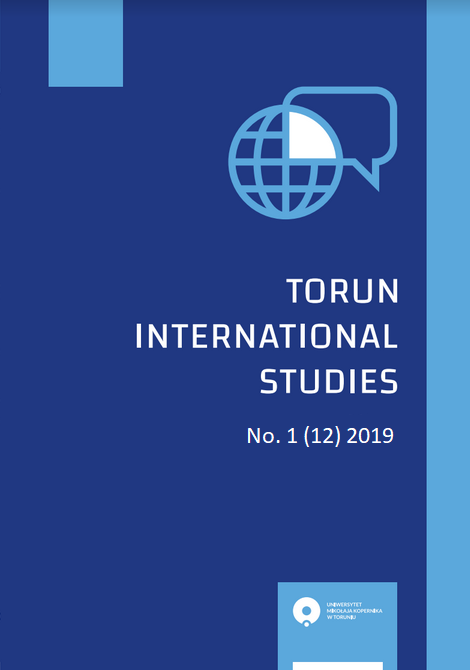INFERIORITY AND VIOLENCE - ISLAMIST TERRORISM SEEN AGAINST THE RESSENTIMENT THEORY
DOI:
https://doi.org/10.12775/TIS.2019.011Keywords
ressentiment, terrorismAbstract
The paper addresses the problem of the relation between ressentiment and Islamic terrorism. The analyses of that correspondence are carried out on the basis of reflections of Friedrich Nietzsche, a renowned German scholar and creator of the first theory of ressentiment, and two American researchers – Lauren Langman and Douglas Morris. In the author’s view, the transition from ressentiment to terrorism essentially stem from the mechanism of the revaluation of values and the reaction to its final product, namely compensatory values, that manifest itself in the form of fundamentalism and fanatism.
References
Auchter, T. (2016). Das Selbst und das Fremde: Zur Psychoanalyse von Fremdenfeindlichkeit und Fundamentalismus. Psyche: Zeitschrift fuer Psychoanalyse und ihre Anwendungen, 70 (9–10).
Berlet, Ch. (2011). Taking Tea Parties Seriously: Corporate Globalization, Populism, and Resentment. Perspectives on Global Development and Technology, (10), 11–29.
Feyerabend, P.K. (2001). Przeciw metodzie, Wrocław: Wydawnictwo Siedmioróg.
Festinger, L., Riecken, H.W. & Schachter, S. (2008). When Prophecy Fails, London: Printer&Martin.
Frings, M. (2005). Max Scheler and the Psychopathology of the Terrorist. Modern Age, 47 (3).
Gledhill, R. (2005, November 22). Multiculturalism has betrayed the English, Archbishop says. The Times. Retrieved December 22, 2019, from www.thetimes.co.uk.
Kaplan, H.B. (1980). Deviant Behavior in Defense of Self to Analyse this Issue, New York: Academic Press.
Langman, L, & Morris, D. (2002). Islamic Terrorism: From Retrenchment to Ressentiment and Beyond. In H. Kushner (Ed.), Essential Readings on Political Terrorism: Analyses of Problems and Prospects for the 21st Century. New York: Richard Altschuler & Associates.
Leon, R., Romero, C., Novara, J., & Quesada, E. (1990). Una escala para medir el resentimiento. In Estudios acerca del resentimiento. Lima: Consejo Nacional de Ciencia y Tecnologia.
Munson, H. (2003). Islam, Nationalism and Resentiment of Foreign Domination. Middle East Policy, 10 (2).
Nietzsche, F. (1988). Nachgelassene Fragmente 1884–1885, Kritische Sudienausgabe. Herausgegeben von Giorgio Colli und Mazzino Montinari. Berlin/New York: Deutscher Taschenbuch Verlag de Gruyter.
Nietzsche, F. (1995). ECCE HOMO. Krakow: Wydawnictwo Baran i Suszczyński.
Nietzsche, F. (1997). Z genealogii moralności. Warszawa: Jakób Mortkowicz 1905 or Kraków: Znak 1997.
Nordstrom. C., Friedenberg, E., & Gold, H. (1967). Society’s Children: A Study of Ressentiment in the Secondary School. New York: Random House.
Pies, R. (2001). A Simple Way to End Terrorism. Journal of Mundane Behavior, 2 (3).
Scheler, M. (1978). Das Ressentiment im Aufbau der Moralen. Frankfurt am Main: Klostermann.
Smith, R.A. (1993). Nietzsche: Philosopher of Ressentiment? International Studies in Philosophy, 25 (2), 135–143.
Weber, M. (2008). Wirtschaft und Gesellschaft – Grundriss der verstehenden Soziologie. Frankfurt am Main: Zweitausendeins.
Williams, D. (1976). Ressentiment and Schooling. Educational Theory, 26 (1), 72–80.
Wurmser, L. (2001). Die zerbrochene Wirklichkeit. Psychoanalyse als das Studium von Konflikt und Komplementaritaet. Göttingen: Vanenhoeck & Ruprecht.
Wynne-Jones, J. (2006). Britain Must Regain a Pride in its Identity, Chief Rabbi Warns. The Telegraph. Retrieved December 22, 2019, from: http://www.telegraph.co.uk/news/uknews/1529037/Britain-must-regain-a-pride-in-its-identity-Chief-Rabbi-warns.html
Downloads
Published
How to Cite
Issue
Section
Stats
Number of views and downloads: 598
Number of citations: 0



